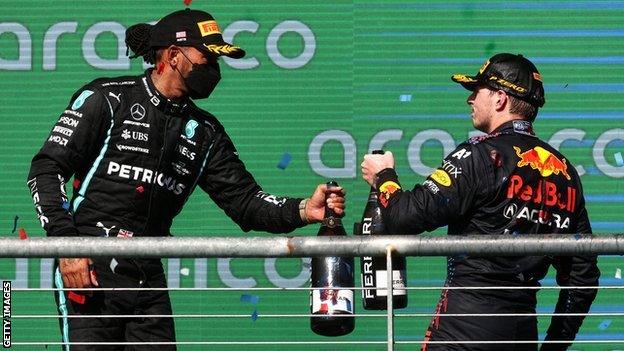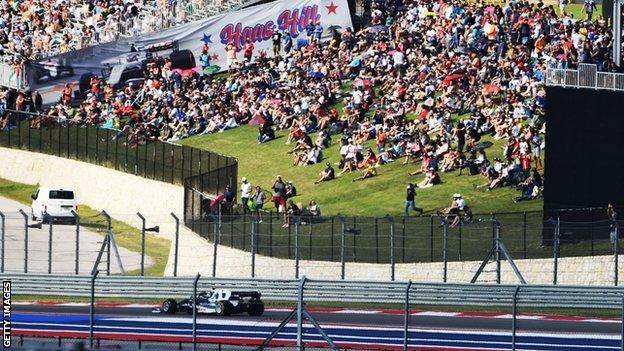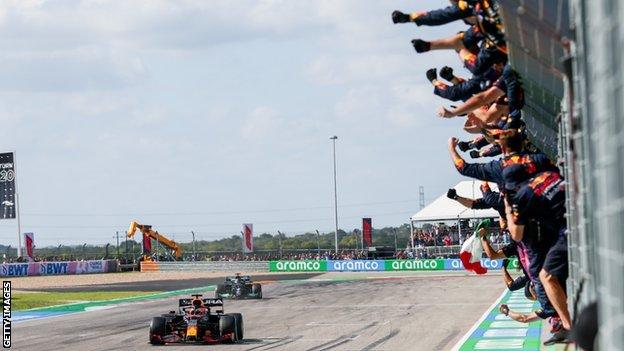US GP: One of the best title battles for years heads to its climax
- Published
- comments

Verstappen celebrates his eighth victory this season
The United States Grand Prix was a race that encapsulated the 2021 Formula 1 season so far - incredibly close, tense and gripping, decided by fine margins, and ending with Max Verstappen's Red Bull on top.
Verstappen's eighth victory in 17 races was one of the best of his career. It was founded on typically aggressive and dynamic Red Bull strategy.
And, in burying the impression that Mercedes were building a potentially title-winning advantage with their car, it re-established Verstappen as the man with the strongest hand as one of the best title battles for years heads into its climax.
At Mercedes, meanwhile, they were left asking themselves questions as to whether, after Lewis Hamilton took the lead at the start, they could have done anything to win the race.
Had Hamilton won, he would have retaken the championship lead.
Instead, the 14-point net swing that Verstappen secured by holding off the charging seven-time champion in an exciting finale secured the Dutchman a 12-point lead heading into the final five races and arguably re-established him as the favourite to win his first world title.
How Red Bull pincered Mercedes
The lead changed hands twice. Red Bull admitted they took a gamble to reclaim an advantage they lost when Hamilton got the jump on Verstappen at the start. They were able to hang on to it thanks to a mature and masterful performance from their driver.
The decisive moment was Red Bull's decision to pit early on lap 10 to secure track position.
Verstappen had taken an impressive pole position on Saturday but Hamilton made a better start from the inside of the front row and managed to take the lead at the first corner despite Verstappen squeezing him hard to the inside.
Jumping Verstappen at the start was the only way Hamilton could have had a chance to win the race. Had he not, Verstappen would have cleared off into the distance in the first stint and built a lead from which there would have been no coming back for Mercedes.
That much was clear from the way Verstappen was able to comfortably sit within a second of Hamilton in the opening laps, remarking on how much the Mercedes was sliding around, an indication that it was struggling with its tyres.
To be able to sit so close for so long was a demonstration that the Red Bull was clearly the faster car in the first stint, in which both drivers were on the 'medium' tyres.
Both teams knew that whoever stopped first would take a de facto lead, because of the power of what is known as the 'under-cut', when a driver stops first to benefit from the extra grip afforded by new tyres to leapfrog a rival.
But, seeing how badly Hamilton was struggling with his tyres, Mercedes did not feel they could stop before lap 11 or 12. Seeing Hamilton's problems on the medium tyre, they believed that they would face the same issues on the hard.
If they had stopped, they knew Verstappen would simply stay out and build a big tyre off-set which he could use to come back at them later in the race.
Instead, Red Bull took the early stop.
"We decided to take the gamble and bank some free air," said team boss Christian Horner. "It was going to to put us under pressure at the end, because invariably they would go long."
Red Bull's next move was to force Hamilton into the pits earlier than Mercedes would have wanted by pitting Verstappen's team-mate Sergio Perez two laps later. Mercedes had to respond.
With the two leaders now on hard tyres, Hamilton had to run longer than Verstappen in the second stint to build a tyre off-set, pit later and come back at his rival in the closing laps.
With Perez fading and out of the picture, that's what Mercedes did, making Hamilton's final stop eight laps later than Verstappen.
For a while, the win looked on. In the first stint, with a two-lap tyre off-set, Hamilton had closed a 6.7-second deficit to 3.2secs in 15 laps before Verstappen's final stop.
After his final stop, Hamilton emerged with an eight-lap tyre off-set and an 8.8-second gap to make up. After a few laps easing his tyres in, Hamilton started to take big chunks out of Verstappen's lead. But the Red Bull driver had learned the lessons of his first stint, when he went too hard too soon on his tyres.
While it appeared for a while as if Hamilton had a big pace advantage, what was actually happening was that Verstappen was measuring his pace so that when Hamilton closed in at the end of the race, Verstappen was able to speed up and hold the Mercedes off.
It was an expertly managed race by both driver and team, and a thoroughly deserved win for Verstappen.
There have been some stonkers among Verstappen's 18 career wins. But, Horner was asked, was this the best?
"It's up there," he said. "He managed the race incredibly well. We didn't have a great start but we were able to get the win back, an aggressive strategy and we were able to make it work.
"Max did a fantastic job managing the degradation and having enough rear tyres left for this final five laps, A phenomenal performance by him today. A big win for us at a circuit that Mercedes and Lewis have been so strong at in the hybrid era."

More than 140,000 watched on as F1 returned to the US for the first time since the pandemic
Could Hamilton have won?
The difficult task Mercedes had faced in the race was underlined by the mixed messages coming from them afterwards.
Asked whether there had been a way to win the race, Wolff said: "We could have won the race because we were in the lead but we had a very strong pace on the hard [tyre]. In a way, we need to retrace the weekend from Friday to Sunday.
"Where did we misjudge, where did we get it wrong and what did we do well? There will be plenty of positive discussion about what to learn from this weekend."
Was the Red Bull a faster car in Austin after three races of advantage for Mercedes, Wolff was asked?
"I think the Red Bull was faster on the medium [tyre] and Mercedes was the faster race car on the hard," he said. "Both drivers drove very well today."
Hamilton, though, was not so sure. He did say: "I believe track position was key today."
But he added: "They were quicker all weekend, on all tyres today. Just in the heat, I think the real strength has shone through this weekend, a bit like it has in other places - like Bahrain, this year. So, yeah, did the best I could with what we had.
"The goal was to get in the lead. I finally got a good start. I have not had as good a start as that for a long time and I was really happy with it.
"So, it was about staying clean and coming out ahead and holding on to it. It felt good at the time, and I felt: 'Hey, this is step one,' but they were just too quick."
The obvious question is whether Mercedes should have stopped before Red Bull in the first stint. It would have reversed the race, made Hamilton the man in front being chased down by Verstappen. But Mercedes did not feel it would have worked.
"We were on the back foot," Mercedes boss Toto Wolff said. "We couldn't have gone for an early stop because we didn't think we could finish the race.
"Lewis drove awesomely. He brought in the tyre, remained calm, even though we had 6.5-second deficit and then 8.5secs on the second stop.
"He increased the pace and at a certain stage it was a massive difference. That was brilliantly executed but [he was] just not close enough at the end. When you follow a car you start to suffer a bit. It is what it is and you need to congratulate Red Bull."

There were only 1.3 seconds between the duo at the chequered flag
What does this mean for the run-in?
On the face of it, this result is bad news for Mercedes. They have surrendered a lead and seen Verstappen double his points advantage. Verstappen has eight wins to Hamilton's five this season. And the teams are now heading to two races in Mexico and Brazil that have historically favoured Red Bull.
Mexico, in particular, the Mercedes engineers are worried about. The high altitude there - the track is at 2,000 metres above sea level - is a problem for the Mercedes engine, because of complicated technical reasons to do with the way they run their turbo.
This means that Red Bull's engine partner Honda is more able to compensate for the lack of oxygen in the atmosphere at Mexico City than are Mercedes, so they should have a power advantage. It's hard to see on paper how Mercedes can combat that.
It is the same reason Red Bull are strong - if to a lesser extent - compared to Mercedes in Austria, where the race track is at 700 metres altitude and Verstappen won both races this year. And in Brazil, where Interlagos is at 800 metres, and where Verstappen beat Hamilton at the last race in Sao Paulo in 2019.
The official line from both Red Bull and Mercedes is to play this down.
Horner said: "This year has been so tight between the two teams and there's no reason to think it won't be tight at the next couple of races."
Wolff added: "I don't believe there is a pattern of who suits which tracks."
And Verstappen is sticking to his mantra that he just needs to focus on each race at a time.
"This doesn't really change a lot," he said. "It is all about details. A win for me doesn't give me more confidence. We are all confident in the team that we can do a good job but we need to nail the details and start over again in Mexico to try and get the best of our whole package."
Hamilton, though, suspects his back is against the wall.
"The next two tracks for sure are very strong for Red Bull so it is going to be tough," he said.
"I am not thinking about it at the moment - be happy with the job I did today and live in the moment.
"We were not quick enough today but I will look forward and take it one race at a time. We have no idea. There are two circuits that are strong for Red Bull so we will just try and minimise how strong they can be compared to us and see if we can do a better job."
Wolff said: "We need to be careful we are not swinging too much between mania and depression but eke forward with our understanding of the car.
"There was a never a point [this season] when I thought: 'We are not going to make this [championship].'
"The general feedback [before this race] was: 'You guys are dominating now and what is Red Bull going to do?'
"Fast forward 24 hours and it goes the opposite way. It's about exploiting the product. I call the car the product. How do we deliver the performance? And that is what's going to make the difference between losing and winning."

From paneer to pioneer: Greg Jenner and guests examine the man credited with Britain's first curry house
Tony Bellew is Angry: Besides Gary Neville what frustrates Jamie Carragher most?

